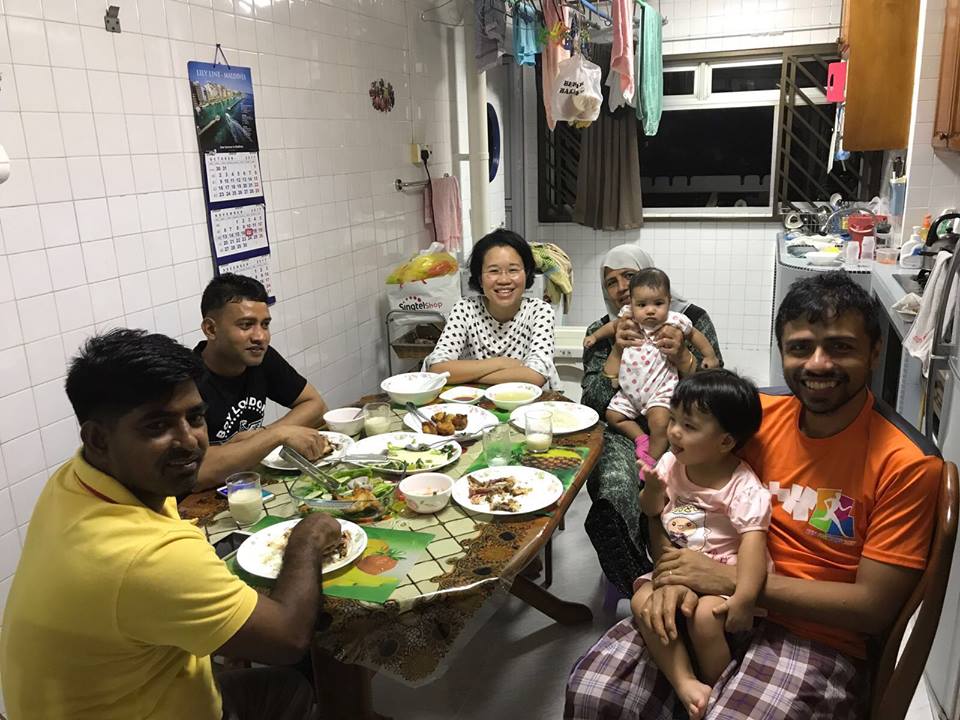Foreign workers invited home for a meal under Singaporean's 'Come Makan With Me' initiative
Sign up now: Get ST's newsletters delivered to your inbox

Mr Mohamad Farid (in orange) with his family and two foreign workers at his parents' flat in Bedok in December 2017.
PHOTO: FACEBOOK/MIGRANT WORKERS' CENTRE
SINGAPORE - Since November last year, a small group of people in Singapore has been quietly inviting foreign workers into their homes for a meal, in an initiative called "Come Makan With Me".
Mr Mohamad Farid, 39, an oncologist, began the movement with the support of the Migrant Workers' Centre (MWC).
MWC shared photos of families having meals with foreign workers on its Facebook page on Friday (March 23).
Mr Farid, who has volunteered at MWC for more than four years, told The Straits Times that the idea had been in his head since he read a 2014 New York Times article about how meals are used to integrate foreigners into Swedish society.
"We let people into our country, but not into our society," Ms Ebba Akerman, the woman who began the movement there, told NYT.
Mr Farid recently raised the idea with MWC executive director Bernard Menon.
"I was sitting with Bernard one day and I said maybe we should just resurrect this idea I had," Mr Farid said.
"He asked me to identify a couple of my friends who would be interested, and we started trying it out from November." At least six households have been involved so far.
The volunteer hosts, who were mainly from his circle of friends and acquaintances, would decide on the date and location and provide the food, and MWC would help put them in touch with the guests.
The sessions were kept small for more intimacy, with an average of two foreign workers invited each time.
These workers were mainly construction workers from Bangladesh or South Asian countries, although it is open to workers from other countries, too.
"The idea is that it snowballs, so the public will start doing it too," said Mr Farid, who is married with two children.
"I've been thinking of some of these issues for a while. It's close to my heart. There are so many migrant workers in this country and they are largely invisible, even though they contribute to Singapore," he said.
"The main thing I was trying to do was to get migrant workers into Singaporean homes. It's not just about giving food - it's about allowing them to enter homes, which I don't think happens often enough."
He added that the objective of the Come Makan With Me sessions is for foreign workers to enter Singaporean homes and "interact with Singaporeans at a level at which they are equals and enjoy one another's company".
There are plans for Come Makan With Me to become a regular practice, with MWC featuring at least one session per month on its social media channels, in the hopes that others will adopt the practice.
According to the MWC's Facebook post, Mr Shafiqul, a worker from Bangladesh who attended one of the sessions, said he was surprised to hear that a Singaporean family wanted to invite him to dinner.
"All the years working in Singapore, I have not expected this to happen," the 29-year-old said. "I am curious to see how the locals live here and this was my chance to experience the life of Singaporeans."
Mr Shafiqul, who has worked here for three years, said he was very touched by "how warm and welcoming the family was and how the children were not shy around me".
"I enjoyed the dinner where we shared everyday stories over delicious food," he said. "I did not feel like an outsider at all and I will share with my friends back home good memories of the family."
MWC executive director Bernard Menon, 44, told ST that concern and a desire to be involved with migrant worker issues "have been rising steadily over the past few years".
He said he hopes the meal initiative would give Singaporeans courage to reach out to foreign workers.
"You never know how many among the local Singaporeans are ready to try something like this. If they see pictures of something like this being done, it may make them feel more adventurous and want to try it," he said.
"Hopefully some day we will reach a point where people won't ill-treat foreign workers, there won't be malpractices, not because it's illegal or they are afraid of penalties, but because socially, Singapore rejects this kind of behaviour."
Those who would like to be volunteer hosts may contact Mr Farid at farid.harunalrashid@gmail.com


